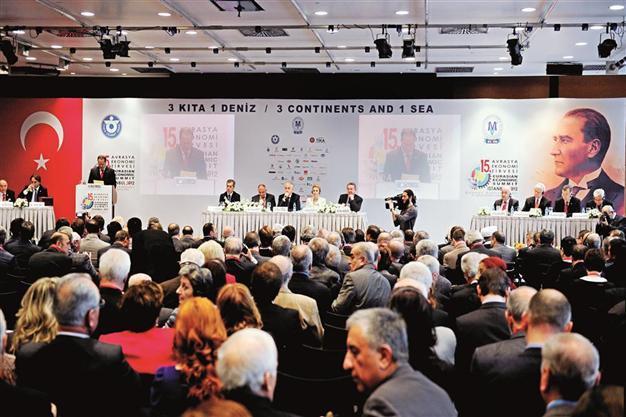Eurasian summit unites nations, goes beyond regional borders
ISTANBUL

A speaker delivers a speech during last year’s summit.
The Marmara Group Foundation is ready to host 422 prominent guests from across the world at its annual Eurasian Economic Summit, an international event that is growing rapidly in terms of participants and program.
Three presidents, one senate speaker, two parliamentary speakers, one prime minister and 36 ministers from several countries, including many from Africa, Asia, Europe and the Americas, are scheduled to share their ideas on crucial worldly issues during two days of sessions that will kick off at Istanbul’s WOW Hotel today.
The summit has attracted substantial participation from Africa, Akkan Suver, the president of the foundation, recently told the Daily News.
Turkish Parliamentary Speaker Cemil Çiçek and Forestry and Water Works Minister Veysel Eroğlu will welcome the guest during the opening session along with Suver, and prominent Turkish officials, including Istanbul Gov. Hüseyin Avni Mutlu, Istanbul Mayor Kadir Topbaş and Turkish Airlines Chief Executive Officer Temel Kotil.
Energy, health, education, women, culture, ecology, information technology and the defense industry will be discussed during the simultaneous sessions today.
Former and current presidents will also discuss the issues of unipolar and multipolar worlds.
Madagascar Prime Minister Omer Berizy and ministers from Tanzania, Mali, South Sudan, Somalia, Morocco and Ethiopia will be attending the summit that will take place between April 9 and 11.
“Peru is an unexpected participating country this year; they wanted to attend the summit despite the name ‘Eurasia,’” said Suver, adding that he took the designation “Eurasia” as a concept rather than a specific geographical area.
This year, Meskhetian Turks will be represented at the summit for the first time and are expected to hold negotiations with Turkish firms, according to Suver.
New trend in exportsIstanbul Textile and Apparel Exporter Associations (ITKIB) management board member Volkan Atik said broader participation has put a mark on this year’s event. “Our exports to Europe decreased around 5 percent due to the economic crisis, but we have experienced the opposite trend in alternative markets,” said Atik.
“The export rate with Iraq increased 52 percent this year, 36 percent with Saudi Arabia, 50 percent with Ukraine, 70 percent with Estonia and 30 percent with Tunisia,” Atik told the Daily News yesterday.
Atik called on Turkish firms to pay attention to the countries speaking Russian, Arabic and Turkish while also producing higher value-added products in order to avoid suffering the adverse effects of the recent European crisis.
